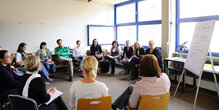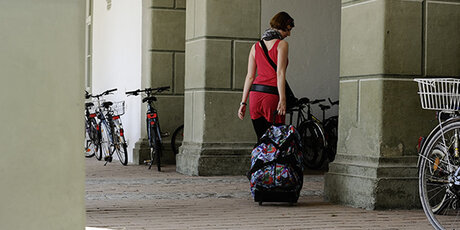The university is a place to ponder values, questions of meaning, theology, religiosity and personal life perspectives.
Mission statement
Through the degree programmes it offers, the university makes a contribution towards fulfilling the social obligations which arise from the Catholic Church’s self-concept, and its history in the charitable, educational and nursing areas. A scientific and at the same time practice-orientated degree programme, along with a Christian view of humanity, shape the university’s special mission. The university orientates itself along the following guiding principles:
The university offers scientifically sound theoretical and practical knowledge and conveys practice-orientated skills and abilities.
The topicality of the course contents, the implementation and further development of the standards for teaching, advanced and further training of the teachers, as well as professional cooperation with practical partners, are of primary importance for the university.
Offers from various disciplines promote fundamental reflection on studying, working and society.
The university promotes the social, nursing and health sciences, and offers innovative solutions to their problems through research and development, as well as through advanced and further training.
This is done on a basis of interdisciplinary cooperation and collaboration with practical partners.
The university is a place of mutual support and cooperation.
Communication among all members of the university, collegial exchange, critical discourse and personal encounters are a common task.
The university participates in professional, academic, social and socio-political discourse.
It is committed to the further development of teaching and learning, as well as studying conditions, and to the professionalisation of social work and nursing. It is in dialogue with other universities in Germany and abroad. It contributes to the creation of a fair society, and the development of a democratic relationship between the genders. It sets priorities in the debate on social policy.
Mission statement
Through the degree programmes it offers, the university makes a contribution towards fulfilling the social obligations which arise from the Catholic Church’s self-concept, and its history in the charitable, educational and nursing areas. A scientific and at the same time practice-orientated degree programme, along with a Christian view of humanity, shape the university’s special mission. The university orientates itself along the following guiding principles:
The university offers scientifically sound theoretical and practical knowledge and conveys practice-orientated skills and abilities.
The topicality of the course contents, the implementation and further development of the standards for teaching, advanced and further training of the teachers, as well as professional cooperation with practical partners, are of primary importance for the university.
The university is a place to ponder values, questions of meaning, theology, religiosity and personal life perspectives.
Offers from various disciplines promote fundamental reflection on studying, working and society.
The university promotes the social, nursing and health sciences, and offers innovative solutions to their problems through research and development, as well as through advanced and further training.
This is done on a basis of interdisciplinary cooperation and collaboration with practical partners.
The university is a place of mutual support and cooperation.
Communication among all members of the university, collegial exchange, critical discourse and personal encounters are a common task.
The university participates in professional, academic, social and socio-political discourse.
It is committed to the further development of teaching and learning, as well as studying conditions, and to the professionalisation of social work and nursing. It is in dialogue with other universities in Germany and abroad. It contributes to the creation of a fair society, and the development of a democratic relationship between the genders. It sets priorities in the debate on social policy.













